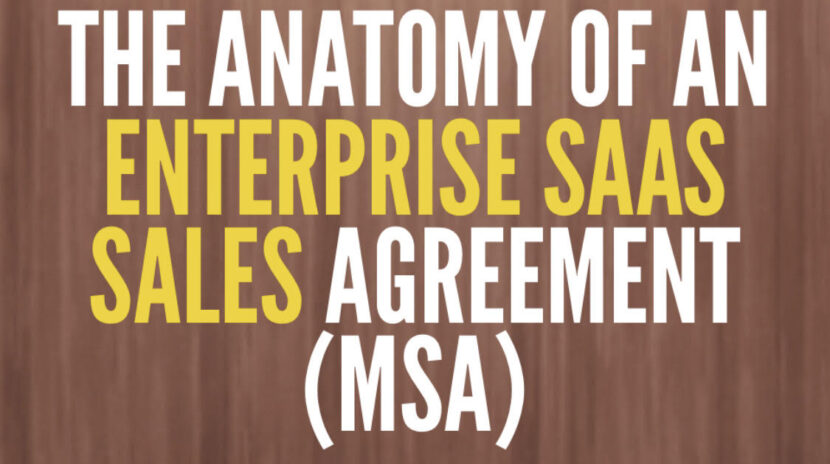If you’re selling a Software as a Service (SaaS) product to Enterprise companies, your customers will demand a strong Enterprise SaaS Sales Agreement. Here is a high level overview of what goes into an Enterprise SaaS Sales Agreement:
- Definitions – each contract has a “Definitions” section to outline what specific meanings are being given to terms throughout the contract. For example, terms such as “uptime”, “customer data”, “service level failure”, and “downtime” could have meanings specific to your SaaS business that may not be a common definition.
- Services and Service Orders – here is where you identify specifically what your SaaS business is doing for your customer. This section can include subsections such as description of services, access and use, documentation license, compliance with laws, sub-contracting, and information around personnel that would be assigned to your customers’ account (if applicable). Also, if you are following an Order Form model (where you have one Enterprise SaaS Sales Agreement and multiple Order Forms that refer to it) – you can identify this.
- Use Restrictions – This section outlines how the customer is restricted from using the application – including sub-licensing, hacking, reverse engineering, using for commercial purposes, or otherwise using your SaaS for illegal operations.
- Service Levels – Here, the agreement outlines what kind of uptime is being promised, and references any other third party agreement that you may have in place. Further, this section should have sub-sections outlining service availability reports, and any remedies in case service levels promised are not met. Consider adding a service level agreement as an Exhibit, or published on your website.
- Support and Maintenance – Your agreement should also outline what kind of customer support and maintenance you offer your customers. This will protect you from violating your Service Levels due to maintenance. Identifying periods when maintenance is performed as well as your support hours is key.
- Data Privacy and Information Security – An increasingly important part – this section outlines how you are approaching data privacy and information security for your SaaS application – including data breach policies, redundancy and backup, high availability, disaster recovery, etc. This can come in the form of an Exhibit, or within the Enterprise SaaS Sales Agreement itself.
- Fees and Payment – this section should outline how you are charging your customers, how you are collecting payment, payment terms, taxes, invoices, and any other specifics around billing. This can refer out to the Order Form for order specific terms, but information payment terms should remain here.
- Confidentiality – Your agreement should define what is considered confidential information, and what is expected from both you and the customer relating to said information. This language mostly remains standard, but you should ensure that you have appropriate protections for your intellectual property.
- Intellectual Property Rights – Your customer is using your intellectual property, which is the SaaS itself, and you may be taking inventory of some of theres. This section should outline who owns what intellectual property, and what rights are being licensed over. Generally, you will own the intellectual property rights to all services and aggregated statistics, while the Customer owns all rights to their Data – giving you a limited right to use that data to provide services.
- Representations and Warranties – This essential section outlines the promises being made by each party that they are indeed able to enter into this agreement. Also, this section outlines the warranties you as the SaaS provider are making to the customer in terms of merchantability, or, alternatively, the warranties you are disclaiming.
- Indemnification – This section is often negotiated, and outlines how you and the customer are indemnifying each other from third party claims. Specifically, if you or the customer are being sued by a third party because of your Services or the Customer’s use of your services – there should be legal recourse for covering judgments and legal fees.
- Limitations of Liability – Another often negotiated section, this essential section limits liability for you and your customer from claims, and can set a monetary limit as to how much can be recovered (such as the total price of the contract) in case there is a breach.
- Term and Termination – Your agreement should outline how long the contract runs, and under what circumstances and procedures can your agreement be terminated or renewed. In the Order Form model, you have a longer term Enterprise SaaS Sales Agreement, and each Order Form will identify a shorter term that references the master agreement.
- Insurance – Your agreement can outline insurance requirements both from you and for your customer – and what kind of minimum coverage either of you should have. This is often a requirement of Enterprise companies.
- Miscellaneous Terms – these are the contract clauses that are included in most agreements – including entire agreement, notices, assignment, third-party beneficiaries, publicity, governing laws, arbitration, and equitable relief. The most negotiated terms in Miscellaneous Terms are governing laws, arbitration, and publicity.
- Data Processing Addendum – If you’re handling personally identifiable information as defined by applicable data privacy laws and regulations, your Enterprise customer will require a Data Processing Addendum be signed.
Let us Help
This post is just a high level overview of what should be in a Enterprise SaaS Sales Agreement. There are many more nuances and specifics around this, and you should have an experienced attorney help you through it to make sure you and your customers are protected.
Kader Law can help you draft a solid Enterprise SaaS sales agreement, review incoming agreements from Customers, and negotiate on your behalf. If you’re interested, feel free to contact us.
This post is not legal advice, and does not establish any attorney client privilege between Law Office of K.S. Kader, PLLC and you, the reader.
